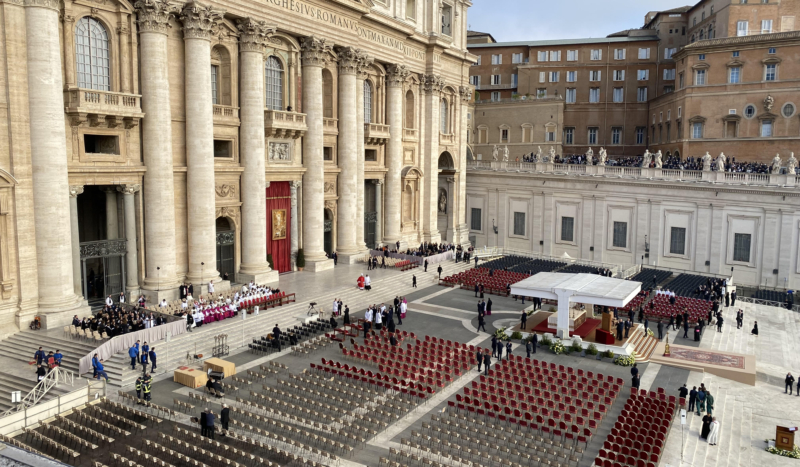
St. Peter's Square April 26, two hours before Pope Francis' funeral. Credit: McKenna Snow
VATICAN CITY // China did not send any delegation to Pope Francis’ funeral, a fact that carries heavy potential consequences and implications in light of the late pope’s efforts to engage with the Communist country, according to one Catholic anthropologist who studies Christianity in China.
The country’s decision to not send anyone to the April 26 funeral was akin to “a slap to Pope Francis,” wrote Michael Chambon in an April 28 op-ed for Union of Catholic Asia (UCA) News.
“From the very beginning of his papacy, Pope Francis showed particular attention to China,” wrote Chambon, who coordinates the Initiative for the Study of Asian Catholics at the National University of Singapore.
He pointed to how Pope Francis not only often expressed his love for the people of China and his desire to visit but also secured the controversial secret Vatican-China agreement in 2018.
Pope Francis “never gave up on China — even when its leaders remained distant and unpredictable,” Chambon wrote. “And this commitment wasn’t only for the benefit of Chinese Catholics; for Francis, it was also about acknowledging China’s role and contributions to the world.”
He noted that even at Pope Francis’ own funeral there was an acknowledgment of China when the last prayer of the faithful was read in Chinese. The other languages read were French, Arabic, Portuguese, Polish, and German.
After the pope’s death, the country did issue a statement of condolences, and China’s Foreign Ministry spokesman Guo Jiakun later commenting: “In recent years, China and the Vatican have maintained constructive contact and carried out friendly exchanges.”
He added: “China is willing to make joint efforts with the Vatican to promote the continued improvement of China-Vatican relations.”
In his article, Chambon argued this was not enough.
“Sober and professional, they reflected a certain normalization of relations between China and the Holy See,” Chambon wrote. “But words alone can never replace a human, fraternal presence.”
“According to informal sources,” Chambon later wrote, China’s decision reportedly stemmed from the country boycotting the Vatican’s refusal to exclude Taiwan’s delegation from attending the funeral.
However, the decision remains confusing, especially because China is presenting itself “as an alternative to American imperialism and a champion of multilateralism,” Chambon wrote, so “it’s hard to understand why it found it necessary to snub one of multilateralism’s most compassionate voices: Pope Francis.”
Chambon argued that by staying away, China “turned its back on a loyal friend.”
He later added, “While China denounces American greed and condemns hegemonic tariffs, it failed to honor a servant of the common good. Its absence from Francis’s funeral only deepens skepticism among its neighbors and the wider world: is China truly different from the hegemons it criticizes?”
Chambon also posited that China’s refusal to send anyone could have implications in the conclave.
“Though it is too soon to gauge their full extent, it is clear that the cardinals advocating constructive dialogue with China will find it harder to be heard,” Chambon wrote. “China’s absence does not help the process of discernment and consensus-building within the conclave.”
Though China did not send anyone to the funeral, they did authorize 93-year-old Hong Kong archbishop emeritus Cardinal Joseph Zen — a fierce critic of the Vatican-China agreement and of the Communist government — as well as Hong Kong Cardinal Stephen Chow, 66, to travel to the Vatican. Cardinal Zen is past the age of eligibility for participating in the conclave, although he did arrive at the Vatican this week and has been participating in General Congregations. Cardinal Chow will participate in the conclave.
Cardinal Zen posted on his X account today that he celebrated Mass in the crypt of Saint Peter’s Basilica.
“Today,” he wrote, “we celebrated the Holy Mass in the crypt of St. Peter’s Basilica, offering special prayers for the Universal Church and the Church in China!”
This story was last updated April 30 at 11:39 a.m. CEST.
